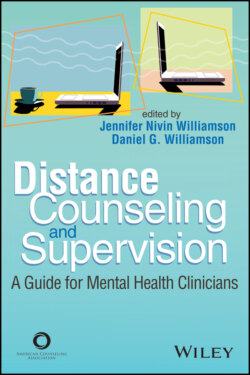Читать книгу Distance Counseling and Supervision - Группа авторов - Страница 12
Residency
ОглавлениеWhen counselors engage in technology-assisted counseling, they should be aware of the laws and regulations in their state of practice as well as the client’s state of residence. In most situations, counselors must adhere to the laws and regulations of both states (ACA, 2014; AMFTRB, 2016; NBCC, 2016b). When clients or counselors travel out of their state of residency (physically or virtually), counselors should be aware of the state’s definition of residency, as each state defines residency differently. Some states allow a client’s residency to be defined by the client’s home address, whereas others define residency as the physical locations of the counselor and/or client at the time of service delivery (AMFTRB, 2016). Some states allow for travel, but they may define the number of days outside of the home state. In this situation, an attorney and the licensure boards for the states in question should be consulted to fully understand the legal definition of residency. Once counselors have identified the legal regulations for their region, they should document their findings as well as their activities in their counseling records (NBCC, 2016b).
When counseling clients who are outside of the United States, it is important to identify the counseling regulations for the counselor’s home state as well as the country and/or region in which the client is living (ACA, 2014). It might be important to identify how mental health services are defined and regulated in the region, as the terms counselor or therapist might have different meanings in different regions. When counselors or clients reside on a military base, the regulations may also be very different. Many U.S. military bases are considered sovereign territory and possess their own regulations regarding licensure. Another factor to consider is where the counseling services are offered, either through a mental health office or through a chaplain’s office. Chaplain or faith-oriented services are sometimes subject to different rules, laws, and regulations, which has implications for confidentiality.
Several resources are available to assist counselors providing telebehavioral health services. ACA provides resources regarding client/counselor residency on their website (https://www.counseling.org) and specifically in the Government Resources section (https://www.counseling.org/government-affairs/government-resources-for-counselors).
